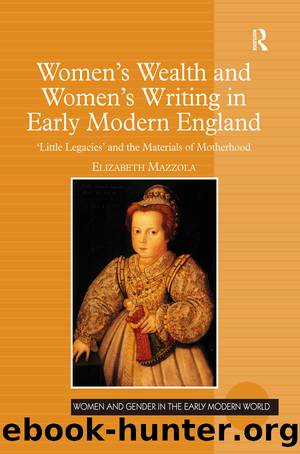Women’s Wealth and Women’s Writing in Early Modern England by Elizabeth Mazzola

Author:Elizabeth Mazzola
Language: eng
Format: epub
ISBN: 9781351871150
Publisher: Routledge
This sonnet sequence, originally written in French—and allegedly written to James Hepburn, the earl of Bothwell—has long been controversial; and the details of production and circulation are as complicated as those surrounding the needlework. Darnley was murdered in February of 1567, and Mary remarried three months later after an apparently collusive abduction in April of that year. The sonnets, if they are hers, would seem to date from this disturbed period just before or after Darnley’s death, when she was awaiting reassurances from her lover and from the Scottish nobles, some of whom would rally behind Mary, others of whom rebelled and forced her to surrender in June .28 But the political crisis pales next to the erotic uncertainty Mary faces in her poems: her position as queen of Scotland is jeopardized not because of civil unrest but because of unrequited affection. This is a reversal of the way courtiers like Sidney employed love poetry to “metamorphize rivalry” among themselves, according to Arthur Marotti—although such a practice emerged, Marotti notes, in the latter part of Queen Elizabeth’s reign (pp. 396–7), long after the equivocal appearance of Mary’s sonnets. Mary’s poems, in contrast, explicitly downplay politics in favor of other contests. Before the marriage to Bothwell could take place, an expedited divorce from Jane Gordon, Lady Bothwell, had to be obtained. Without a marriage to sanctify their love (or reward a plot to murder Darnley), Mary appears strangely paralyzed, but the sonnets picture for us a queen who again and again wishes to remind us that she’s a woman and, for that reason, powerless.29
If Mary’s needlework boldly announces the claims of maternity and genealogy over the rulings of the English state, there is a conflict between external and internal forces in the sonnets, something which also forms much of their subject matter. Male lovers since Petrarch were able to make the beloved’s powers their own: praising her eyes or heart or breasts, they fashioned out of their gaze a poetic identity that made female beauty an instrument rather than a snare. Female sonneteers drew then on tools and images and habits meant to disable women. Rarely did women’s love poetry turn the tables on the male beloved or on Petrarchan habits: Mary Wroth’s Pamphilia never, for instance, exacts revenge on her inconstant lover. Instead, female poets often turn the dismembering gaze on themselves. As Diana E. Henderson observes, when female poets complained, they “called attention to their lack of education and access to language, and deprecated their ability as a result; however, literary genres per se were not perceived as the sources of inhibition.”30
Mary Stuart’s poetry seems to fit this characterization, too, providing her with the opportunity to abandon politics altogether rather than “to take on a masculine role and its powers and/or to modify them so that they capture experiences and values perceived as feminine.” Mary explains her abjection as abdication in the first sonnet:
For him I value all my friends as less than nothing
And of my enemies I hope well.
Download
This site does not store any files on its server. We only index and link to content provided by other sites. Please contact the content providers to delete copyright contents if any and email us, we'll remove relevant links or contents immediately.
Still Me by Jojo Moyes(11253)
On the Yard (New York Review Books Classics) by Braly Malcolm(5524)
A Year in the Merde by Stephen Clarke(5417)
Eleanor Oliphant Is Completely Fine by Gail Honeyman(5273)
The Bookshop by Penelope Fitzgerald(3844)
How Music Works by David Byrne(3259)
Surprise Me by Kinsella Sophie(3108)
Pharaoh by Wilbur Smith(2987)
Why I Write by George Orwell(2944)
A Column of Fire by Ken Follett(2607)
Churchill by Paul Johnson(2578)
The Beach by Alex Garland(2559)
The Songlines by Bruce Chatwin(2549)
Aubrey–Maturin 02 - [1803-04] - Post Captain by Patrick O'Brian(2304)
Heartless by Mary Balogh(2258)
Elizabeth by Philippa Jones(2198)
Hitler by Ian Kershaw(2194)
Life of Elizabeth I by Alison Weir(2078)
Harry Potter and the Cursed Child by J. K. Rowling & John Tiffany & Jack Thorne(2058)
